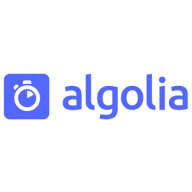Algolia vs Yext: Which search solution fits your needs?
- 01Algolia vs Yext: overview
- 02What's the difference between Algolia and Yext?
- 03Algolia pros and cons
- 04Yext pros and cons
- 05Algolia compared to Yext
- 06Yext compared to Algolia
- 07Features comparison
- 08Algolia vs Yext: Which is the best for your business?
- 09Promotions on Web Development software
- 10Alternatives to Algolia & Yext
Access up to $10,000 savings on Algolia & $35,000 on Yext
Yext
$35,000 credits
Access up to $10,000 savings on Algolia & $35,000 on Yext
Yext
$35,000 credits
Search and discovery are critical components of delivering a seamless and personalized experience to your users. However, building and maintaining a powerful search solution involves many complex factors. From handling large volumes of data efficiently to delivering relevant results quickly, each aspect plays a crucial role in user satisfaction. Additionally, the ability to customize and fine-tune search algorithms to meet specific business needs is essential.
Thankfully, there are several search solutions available to help you manage these challenges. In this comparison, we’re focusing on two leading players in the search technology space—Algolia and Yext. We'll explore their key features, differences, and ideal use cases. By the end of this article, you'll have a clear understanding of which search platform is best suited for your business needs.
Algolia vs Yext: overview
Algolia and Yext are two prominent players in the customer experience software category, each offering unique strengths tailored to specific business needs.
Algolia is highly regarded for its lightning-fast search capabilities and advanced customization options, making it an excellent choice for businesses that require precise and scalable search solutions. On the other hand, Yext offers a more comprehensive approach to search, with a focus on enhancing your brand's digital presence across various platforms. In addition to its search functionality, Yext provides features like knowledge management, local listings, and reviews management, making it a valuable tool for businesses that need to manage and optimize their search results across multiple channels.
When deciding between Algolia and Yext, it's important to consider your specific needs and goals. Algolia may be the best fit for businesses seeking a highly customizable and developer-friendly search solution, while Yext offers a broader range of features for businesses aiming to enhance their overall digital presence.
What's the difference between Algolia and Yext?
Both Algolia and Yext are powerful search platforms, each with unique strengths that cater to different business needs. The primary distinction between Algolia and Yext lies in their focus and target user base. Algolia is renowned for its advanced search capabilities, particularly favored by developers and e-commerce businesses that require fast, customizable, and highly relevant search results. Yext, on the other hand, offers a broader suite of tools that not only provide search functionality but also enhance a brand’s digital presence across multiple platforms.
Algolia excels in providing a search experience that is both lightning-fast and highly customizable. It is designed for businesses that need precise control over their search algorithms, enabling them to deliver real-time, relevant results as users type. This makes Algolia a go-to solution for e-commerce platforms, SaaS companies, and any business that prioritizes user experience through powerful search functionality. The platform’s ability to handle large volumes of data and complex queries efficiently is one of its standout features.
Yext, in contrast, is more than just a search platform. It offers features such as knowledge management, local listings, reviews management, and more, aimed at improving a brand’s visibility across search engines, maps, and other digital channels. Yext is ideal for businesses that need to maintain consistent and accurate information across various platforms, particularly in industries like retail, hospitality, and healthcare, where local search accuracy is crucial.
Another key difference lies in their approach to implementation and usability. Algolia offers deep customization and robust APIs, which can involve a steeper learning curve but provide unmatched flexibility. Yext’s platform is more user-friendly, with an emphasis on managing brand information across multiple channels, making it accessible to businesses with less technical expertise.
In summary, Algolia is best suited for businesses that require a powerful, customizable search engine, while Yext offers a comprehensive solution for managing and optimizing digital presence across platforms.
Algolia pros and cons
What are the advantages of Algolia?
- Lightning-fast search performance: Algolia is renowned for its speed, delivering real-time search results as users type. This responsiveness enhances user experience, especially in applications where quick access to information is critical.
- Highly customizable: Algolia offers extensive customization options, allowing developers to fine-tune search algorithms and tailor the search experience to meet specific business needs. This flexibility is ideal for complex search requirements.
- Scalable for large datasets: Algolia handles large volumes of data efficiently, making it a scalable solution for businesses with extensive catalogs or content. It’s well-suited for e-commerce platforms and SaaS companies with significant data needs.
- Comprehensive API support: Algolia provides a robust set of APIs, making it easy for developers to integrate search functionality into various applications and customize it extensively. This API-centric approach supports a wide range of use cases.
- Advanced features: Algolia offers advanced features like typo tolerance, synonym management, and faceted search, which enhance the relevance and accuracy of search results, leading to better user satisfaction.
What are the disadvantages of Algolia?
- Complex setup for non-technical users: While Algolia offers extensive customization, the setup and configuration process can be complex, especially for non-technical users or businesses without dedicated development resources.
- Cost: Algolia’s pricing can be on the higher side, particularly for businesses with large data sets or high traffic volumes. The cost can increase significantly as more advanced features and higher usage tiers are required.
- Limited analytics: Although Algolia provides some analytics capabilities, they are not as comprehensive as other search solutions. Businesses may need to integrate with additional tools to get deeper insights into search performance and user behavior.
- Steep learning curve: For businesses that are new to search optimization, Algolia’s advanced features and customization options can present a steep learning curve, requiring time and expertise to fully leverage its capabilities.
- Dependence on internet connectivity: Algolia is a cloud-based solution, meaning that reliable internet connectivity is required to access its services. In environments with poor connectivity, this could potentially lead to disruptions in search performance.
Compare Algolia to other tools
Yext pros and cons
What are the advantages of Yext?
- Comprehensive digital presence management: Yext offers a robust platform that goes beyond search functionality, providing tools for managing a brand's presence across various digital platforms, including search engines, maps, and social media. This is particularly beneficial for businesses needing consistent and accurate information across multiple channels.
- User-friendly interface: Yext’s platform is designed to be user-friendly, making it accessible to businesses with varying levels of technical expertise. The intuitive interface simplifies the process of managing listings, reviews, and other aspects of digital presence.
- Enhanced local search optimization: Yext excels in optimizing local search, helping businesses ensure that their locations appear correctly and prominently in local search results. This is crucial for industries like retail, hospitality, and healthcare, where local search visibility directly impacts customer acquisition.
- Rich knowledge management features: Yext’s Knowledge Graph allows businesses to centralize and manage their data, ensuring that accurate and up-to-date information is displayed across all platforms. This feature is particularly useful for maintaining consistency across large organizations with multiple locations.
- Reputation management tools: Yext provides tools for monitoring and managing online reviews, allowing businesses to respond to customer feedback and improve their online reputation. This helps in building trust and enhancing customer relationships.
What are the disadvantages of Yext?
- Cost: Yext can be expensive, particularly for small businesses or those with multiple locations. The pricing structure may not be cost-effective for smaller enterprises that only need basic search or listing management features.
- Limited customization for search: Compared to dedicated search solutions like Algolia, Yext’s search customization options are more limited. Businesses with specific or complex search requirements may find Yext’s search capabilities less flexible.
- Dependence on Yext ecosystem: Yext’s value is maximized when using its entire ecosystem of tools and services. Businesses that only need specific features might find it difficult to justify the cost and may feel locked into the platform.
- Learning curve for advanced features: While the basic features of Yext are user-friendly, some of the more advanced functionalities, such as in-depth analytics or complex knowledge management, can present a learning curve for users who are not familiar with them.
- Limited API capabilities: Yext’s API capabilities are not as extensive or flexible as some other platforms, which could be a limitation for developers looking to deeply integrate Yext into custom applications or workflows.
Compare Yext to other tools
Algolia compared to Yext
Algolia and Yext serve distinct purposes in the digital landscape. Algolia is a specialized search platform known for its speed, scalability, and deep customization, making it ideal for businesses that prioritize a powerful and flexible search experience. It excels in delivering real-time, relevant results, particularly in e-commerce and data-heavy applications.
In contrast, Yext offers a broader digital presence management platform, focusing on ensuring consistent and accurate information across search engines, maps, and other online channels. While Yext provides basic search capabilities, its strength lies in managing and optimizing a brand’s visibility across multiple platforms.
Is Algolia better than Yext?
Whether Algolia is better than Yext depends on your specific business needs. If you prioritize delivering a fast, customizable search experience with advanced features like faceted search and typo tolerance, Algolia is the superior choice. It excels in enhancing user engagement through precise and scalable search solutions, particularly in e-commerce and data-driven environments.
However, if your focus is on managing and optimizing your brand’s presence across various digital platforms, ensuring consistent information, and improving local search visibility, Yext is more suitable.
What is Algolia best used for?
Algolia is best used for delivering fast, relevant, and customizable search experiences across digital platforms. It excels in scenarios where search speed and accuracy are critical, such as e-commerce sites, SaaS applications, and content-rich websites.
With its powerful APIs and extensive customization options, Algolia allows developers to fine-tune search algorithms to meet specific business needs, providing real-time, predictive search results as users type. It's particularly well-suited for businesses that require scalable search solutions capable of handling large datasets, complex queries, and a need for high performance and user engagement.
Can Algolia replace Yext?
Algolia and Yext serve different purposes, so Algolia cannot fully replace Yext. Algolia excels as a high-performance search engine, offering fast, customizable search experiences ideal for e-commerce, SaaS, and content-rich platforms. However, Yext provides a broader range of tools focused on managing and optimizing a business’s digital presence across search engines, maps, and various platforms. Yext's strengths lie in local search optimization, knowledge management, and maintaining consistency across multiple channels.
While Algolia can handle search functionality, it lacks the comprehensive digital presence management and local search features that Yext offers, making them complementary rather than interchangeable solutions.
Is Algolia cheaper than Yext?
Algolia and Yext have different pricing models, making direct cost comparisons challenging. Generally, Algolia may be more cost-effective for businesses focused solely on search functionality, as its pricing is based on usage metrics like the number of search requests and indexed records.
In contrast, Yext offers a broader suite of services, including digital presence management and local SEO, which can result in higher costs, especially for businesses with multiple locations or complex needs. While Algolia’s pricing plans can be cheaper for search-specific needs, Yext’s comprehensive platform often justifies its higher price for businesses requiring extensive digital management features.
Is there a better Web Development software than Algolia?
While Algolia is a leading search platform known for its speed, customization, and scalability, it's wise to explore other search software options to ensure you find the best fit for your specific needs.
Several notable alternatives to Algolia include Elasticsearch, Bloomreach, Swiftype, and Amazon CloudSearch.
Choosing the ideal search platform depends on your business's unique requirements, priorities, and goals. If you're looking for a solution that excels in delivering fast, relevant, and highly customizable search experiences, Algolia might be the perfect match. However, considering these alternatives can provide valuable insights and help you make a well-informed decision that best aligns with your search and discovery needs.
$10,000 in credits for 1 year on Algolia
Get $10,000 in credits for 1 year on Algolia and up to $10,000 savings with Secret.
Yext compared to Algolia
Yext and Algolia serve distinct purposes, with Yext focusing on managing and optimizing a business's digital presence across various platforms, including search engines, maps, and directories. Yext excels in local search optimization, knowledge management, and maintaining consistent brand information online.
In contrast, Algolia is a specialized search engine designed for fast, customizable, and scalable search experiences, particularly suited for e-commerce, SaaS, and content-heavy websites. While Yext provides a broader range of digital management tools, Algolia offers superior search capabilities.
Is Yext better than Algolia?
Whether Yext is better than Algolia depends on your business's primary needs. If you require a platform that excels in managing your brand’s digital presence, ensuring consistency across search engines and directories, and optimizing for local search, Yext is the better choice. It is particularly effective for businesses with multiple locations that need to maintain accurate and consistent information across various online platforms.
However, if your primary focus is on delivering a fast, customizable search experience with advanced features, Algolia is more suitable.
What is Yext best used for?
Yext is best used for managing and optimizing a business's digital presence across various online platforms, including search engines, maps, directories, and social media. It is particularly effective for businesses with multiple locations that need to ensure accurate and consistent information, such as addresses, hours, and services, across the web.
Yext excels in local search optimization, helping businesses improve their visibility in local search results and manage online reviews. It's ideal for companies looking to maintain a cohesive and accurate digital presence while enhancing their local SEO efforts and customer engagement across multiple channels.
Can Yext replace Algolia?
Yext cannot fully replace Algolia because they serve different purposes. Yext is designed for managing and optimizing a business's digital presence across platforms like search engines, maps, and directories, focusing on local SEO and brand consistency. In contrast, Algolia is a specialized search engine platform that excels in delivering fast, customizable, and scalable search experiences, particularly for e-commerce and content-rich websites.
While Yext offers basic search functionality as part of its broader suite, it lacks the advanced, real-time search capabilities that Algolia provides. Therefore, Yext and Algolia are complementary rather than interchangeable solutions.
Is Yext cheaper than Algolia?
Yext and Algolia have different pricing structures, making direct cost comparisons challenging. Yext’s pricing plans typically involve higher costs due to its comprehensive suite of tools for managing digital presence, local SEO, and brand consistency across multiple platforms. These features are particularly valuable for businesses with multiple locations or complex digital needs.
Algolia, on the other hand, focuses on providing high-performance search functionality, with pricing based on usage factors like search requests and indexed records. For businesses primarily needing search capabilities, Algolia may be more cost-effective. However, Yext's broader offerings often justify its higher price for those needing extensive digital management solutions.
Is there a better Customer Support software than Yext?
While Yext offers a robust platform for managing digital presence and optimizing local search, it's wise to explore alternative solutions to ensure you find the best fit for your specific needs.
Several noteworthy alternatives to Yext in the digital presence and local SEO landscape include Moz Local, BrightLocal, Synup, and Uberall.
The selection of the ideal digital presence management software depends on your business's unique requirements, priorities, and goals. If you need a platform known for its comprehensive tools, including knowledge management, review monitoring, and local listings optimization, Yext might be the right choice. However, considering these alternatives can provide valuable insights and help you make a well-informed decision tailored to your specific digital management needs.
$35,000 credits on Yext
Get $35,000 credits on Yext and up to $35,000 savings with Secret.
Features comparison
Algolia Excels Over Yext with Advanced Search Capabilities
Algolia stands out with its advanced search capabilities, offering features like faceted search, typo tolerance, synonyms, and geolocation-based search. These tools significantly enhance the user search experience by allowing for refined searches, automatic correction of spelling mistakes, and the delivery of relevant results based on the user's location. For example, an e-commerce site using Algolia can enable users to filter products by category, automatically correct common typos, and provide location-specific product availability.
While Yext offers robust AI-based search that understands natural language queries, it does not explicitly provide features like typo tolerance or geolocation-based search. This makes Algolia the superior tool for businesses that need powerful, user-focused search functionality, especially in environments where precision and user experience are paramount.
Algolia Outshines Yext in Ease-of-Use with Intuitive Interface
When it comes to ease-of-use, Algolia gains a significant advantage over Yext. Algolia's interface is designed to be intuitive and user-friendly, allowing even beginners to quickly navigate through the platform. The straightforward dashboard, complemented by crisp documentation and detailed tutorials, enables users to get up and running with minimal friction. For example, Algolia’s real-time preview feature helps users instantly see the impact of changes, enhancing the overall user experience.
While Yext also aims for simplicity, some users have reported that its platform can be slightly complex and intimidating, especially during the initial setup and when managing multiple locations or advanced features.
Yext Shines Brighter Than Algolia in Brand Reputation Management
Managing your brand's reputation is where Yext shines brighter than Algolia. Yext excels in integrating customer review management directly into its platform, allowing businesses to gather, monitor, and respond to customer reviews and feedback across various platforms from a centralized dashboard. For example, a retail chain can use Yext to manage reviews from Google, Facebook, and Yelp, ensuring timely responses to customer concerns and maintaining a positive brand image across all locations. This proactive approach to reputation management not only enhances customer trust but also boosts engagement by addressing feedback directly.
In contrast, Algolia, while exceptional in search functionality, lacks tools for managing reviews and customer feedback, making Yext the superior choice for businesses focused on maintaining and improving their online reputation.
Algolia Excels Ahead of Yext in Delivering Lightning-Fast Search Results
Algolia excels at delivering lightning-fast search results, a key differentiator that sets it apart from Yext. Powered by a highly optimized search infrastructure, Algolia ensures that queries return results in milliseconds, providing an instant and seamless user experience. For instance, e-commerce platforms using Algolia benefit from real-time product searches, where customers can see relevant results as they type, significantly enhancing the shopping experience and reducing bounce rates. This speed leads to higher engagement and customer satisfaction, as users can quickly find the information or products they seek.
While Yext offers comprehensive search capabilities within its broader digital presence management platform, it does not specifically emphasize the speed of its results, making Algolia the clear leader for businesses where rapid search performance is crucial.
Algolia Takes the Lead Over Yext in Integration Capabilities
When it comes to integration capabilities, both Algolia and Yext offer extensive options for connecting with third-party tools, but Algolia takes a slight edge. Algolia’s integration ecosystem is particularly robust, supporting seamless connections with popular platforms like Shopify, WordPress, and Magento, making it a preferred choice for e-commerce businesses looking to enhance their search functionalities. Additionally, Algolia provides comprehensive API support, allowing developers to easily integrate custom applications and tailor the search experience to specific business needs.
While Yext also offers valuable integrations, such as with Google My Business, Facebook, and CRM systems, its focus leans more towards managing and synchronizing business data across multiple platforms, rather than enhancing search functionality. Algolia’s flexibility and extensive API documentation make it a more versatile option for businesses seeking deep and customizable integrations.
Both Algolia and Yext Deliver Robust Analytics and Reporting Capabilities
Both Algolia and Yext offer comprehensive analytics and reporting tools that empower businesses to make data-driven decisions. Algolia provides detailed insights into search performance, allowing you to track metrics such as user behavior, search queries, and conversion rates. For example, an e-commerce site can use Algolia’s analytics to understand which products are most frequently searched and adjust their inventory or marketing strategies accordingly.
On the other hand, Yext offers advanced analytics focused on monitoring how customers interact with your brand online, from search queries to click-through rates and review engagement. This helps businesses identify trends, optimize local listings, and enhance brand visibility across multiple platforms. Both tools enable you to identify patterns and optimize your digital strategy, but Yext’s analytics are particularly valuable for businesses looking to improve their overall online presence and customer engagement, while Algolia’s strength lies in refining search relevance and user experience directly within the site or app.
Yext Excels Ahead of Algolia in Ensuring Consistency Across Platforms
Yext excels at maintaining the consistency of business details across various platforms, ensuring that your business information—such as addresses, hours of operation, and contact details—remains accurate and up-to-date across social media, directory listings, and search engines. This capability is crucial for businesses with multiple locations, as it enhances customer trust and boosts credibility by preventing discrepancies that could confuse or frustrate potential customers. For example, a restaurant chain can use Yext to automatically update its hours across Google, Yelp, and Facebook with a single change.
While Algolia offers a seamless and powerful search experience within your website or app, it doesn't specifically focus on ensuring information consistency across multiple external platforms. This gives Yext the upper hand for businesses prioritizing brand consistency and visibility across the digital ecosystem.
Subscribe to our newsletters.
No FOMO here. Stay up-to-date on all the latest deals and news with our monthly newsletter straight to your inbox like 124,000+ entrepreneurs (+ Get 10% off on on our Premium Membership!)
Algolia vs Yext: Which is the best for your business?
Algolia is the best tool for you if:
- You need a search engine that delivers lightning-fast, real-time results, enhancing user experience by providing immediate, relevant responses to queries as users type.
- You require advanced customization options to tailor search algorithms precisely to your business needs, enabling a highly personalized and optimized search experience for your users.
- Your platform handles large volumes of data or complex queries, and you need a scalable solution that can manage this efficiently without compromising on speed or accuracy.
- You prioritize developer-friendly tools and robust API support, allowing seamless integration and extensive customization within your existing tech stack.
- Your business operates in e-commerce, SaaS, or a content-rich environment where search relevance and precision directly impact user engagement and conversion rates.
Yext is the best tool for you if:
- You need to manage and synchronize your business information across multiple platforms, ensuring accuracy and consistency on search engines, directories, and social media.
- You prioritize local SEO and want to enhance your business’s visibility in local search results, particularly if you have multiple locations.
- Your business relies heavily on maintaining a positive online reputation, and you need tools to monitor, respond to, and manage customer reviews across various platforms.
- You want to streamline the management of your brand’s digital presence, including updating details and ensuring uniformity across all online listings from a centralized dashboard.
- Your focus is on improving customer engagement and trust by ensuring that your business details are always accurate and up-to-date across all digital touchpoints.
Alternatives to Algolia & Yext
Promotions on Web Development software
Start saving on the best SaaS with Secret.
Secret has already helped tens of thousands of startups save millions on the best SaaS like Algolia, Yext & many more. Join Secret now to buy software the smart way.















